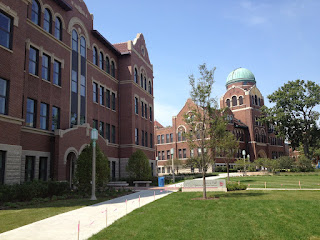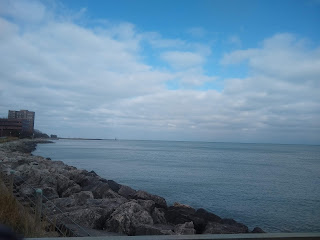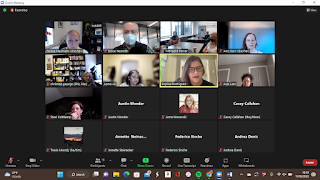 |
| Cuneo Hall (swiped from luc.edu) |
Three alumni from the Center for Urban Research and Learning shared recollections and advice via Zoom last week. The Center is located at Loyola University on the north side of Chicago, and recently celebrated its 25th anniversary, having been founded in 1996. From the beginning its focus has been on seeking knowledge that is practical and helpful. The Center funds faculty and student research that is "action-oriented," with "linkage with Chicago communities" is at the core of its activity. Its mission statement states the goal of developing "innovative solutions that promote equity and opportunity in communities throughout the Chicago metropolitan region and beyond."
 |
| Ellen Shephard at CURL in 2016 |
I first encountered the Center's Friday Morning Seminars in the fall of 2016, when I was searching for some gathering in the Chicago area that would support my study of cities. I saw Ellen Shephard of Community Allies speak memorably on the economic contributions of local businesses; I still refer to the notes I took that day. Subsequently I attended talks by graduate student Bill Byrnes in 2017 on law enforcement and the black middle class, alumna Dr. Sophia Rodriguez of the University of Maryland in 2018 on the role of public libraries in orienting recent immigrants, and Jennifer Axelrod of the Chicago Community Trust in 2019 on philanthropic efforts to address the racial wealth gap.
Then came the coronavirus pandemic, which kept me away for two years When I returned this year, I saw that things weren't quite back to normal; most people including the presenters were on Zoom, while I shared the seminar room with the two people who were producing the Zoomcast. Oh well. Maybe next year, we will all be in person, and can enjoy one of those marvelous spreads virtually everybody on the panel remembered from past CURL events.
Sophia Rodriguez, who received her Ph.D. from Loyola in 2014, recalled that once she got connected to CURL, "things seemed more real there" than in her graduate department where she felt herself losing touch with the education communities where she had worked and which she was now studying. The "ethical community-based work" of the Center spoke to her, so in addition to her graduate assistantship she worked on a CURL project bringing organizational leaders together around early childhood education policy proposals.
Asma Ali, specialist master at a major consulting firm--supposed to be unnamed but pretty quickly revealed to be Deloitte Touche--noted the variety of projects in which she was involved with CURL, in contrast to the focused specialization of the Ph.D. program. She commended CURL's founding attention to cultural responsiveness. "The stop-and-listen part is getting more attention" from programs today, she noted, but "CURL was doing it 20 years ago." Talking and listening to under-represented communities is not "just a soft skill that anybody can pick up." CURL not only taught her how to do that, but inspired her to push for it in her various jobs since.
Amy Kerr, director of evaluation at the for-profit consulting firm Professional Data Analysts, agreed that "learning to build trust" is essential to the work of CURL. She advised current students to "think about what you want your life to look like" after graduation. She said she had always admired top university researchers, but knew she could not be "a happy human being" in such a job. She advised students to stay open and keep learning on the job, but also to keep asking whether they were where they wanted to be and whether their life looked like they wanted it to look. "Are you living your values day-to-day?"
The emphasis on the values that infused the work of the Center and its fellows came up again and again on the panel--quite a contrast to the phrase "value-free" which was all in vogue when I was in graduate school. In this way they are not just "contributing to understanding," the felicitous phrase used by my graduate adviser, but they contribute continuously to the possibility of common life.
The panel was moderated by Teresa Naumann, operations manager and senior researcher at the Center.
 |
| Loyola University is located right by Lake Michigan, as in right by. |





No comments:
Post a Comment